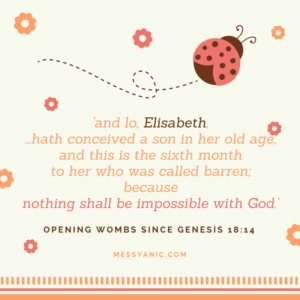Many in the Virgin Birth Doctrinal claim camp understand the statement, nothing shall be impossible with God in Luke 1:37 is specifically pertaining to Mary and the child she will conceive.
 But is Mary to whom the messenger was referring?
But is Mary to whom the messenger was referring?
Read Genesis 18:10-14 in the Septuagint:
And he said, I will return and come to thee according to this period seasonably, and Sarrha thy wife shall have a son; and Sarrha heard at the door of the tent, being behind him. And Abraam and Sarrha were old, advanced in days, and the custom of women ceased with Sarrha.
And Sarrha laughed in herself, saying, The thing has not as yet happened to me, even until now, and my lord is old. And the Lord said to Abraam, Why is it that Sarrha has laughed in herself, saying, Shall I then indeed bear? but I am grown old. Shall anything be impossible with the Lord? At this time I will return to thee seasonably, and Sarrha shall have a son. (Genesis 18:10-14 Brenton)
Given what the author of Luke has already revealed concerning Elisabeth earlier in chapter 1, in conjunction with the messenger’s reference to her in verse 36, to whom do you think the messenger intended this statement, “nothing shall be impossible with God”, to pertain: Elisabeth or Mary?
Would a virgin espoused to a man receiving news of a future conception and birth be considered an impossibility?
Why then, do you think the messenger draws Mary’s attention to Elisabeth’s condition?
[- excerpt from The Birth of Jesus Christ – According to Luke and Acts: A Biblical Study Guide to be released in October 2017]

